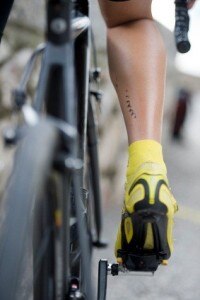Brandon Marsh says:
“Be obsessive”
Triathletes are widely known for being perfectionists. We obsess over everything, from the aerodynamics of our bike to the optimal heart rate zone on a long run to greater distance per stroke in the water. And, because you’re a “crazy triathlete,” this kind of data analysis is second-nature.
But after a couple weeks of big races for me, Amy and our age-group athletes, I realized there are other specifics triathletes need to obsess over. Triathlon is a sport with many moving parts. If these seemingly small parts are neglected, they can become big problems, especially when your race is in a different city or state from where you train. Will you have to rent a bike? Do you need to take your own food?
Let’s review some commonly ignored details and how you can “be obsessive.”
 Bike measurements ““ You’re probably perfectly fitted to your bike, which helps reduce the risk of injury due to an imbalanced seat position. But you won’t fit another bike the same way. In case you rent a bike for a race, ride multiple bikes during training or buy a new one altogether, I encourage you to write down these key measurements:
Bike measurements ““ You’re probably perfectly fitted to your bike, which helps reduce the risk of injury due to an imbalanced seat position. But you won’t fit another bike the same way. In case you rent a bike for a race, ride multiple bikes during training or buy a new one altogether, I encourage you to write down these key measurements:
— The distance from your seat to the handlebars
— The distance your seat is in relation to the bottom bracket (where your cranks are)
— The shape, thickness and length of your saddle
Bike equipment ““ If you own multiple bikes and switch between them often, I suggest using the same shoes and pedals on each bike. Handlebars may be another consideration; yet the same style doesn’t always work on different bikes. When you can’t travel with your bike to a race, do your research on the bike you’ll be renting to get a “handle” on its components in relation to your comfort level. This, too, can help lessen the chance of a bike-related injury.
Pre-race diet ““ Even traveling a couple hours for a triathlon can leave you high and dry for healthy food options. Search the Internet or ask locals for a good grocery store and any familiar restaurant chains ““ preferably, before you go. This will help you eat similar to how you would back home. Do NOT try anything new or out of the ordinary when on a triathlon travel trip. The last thing you want before or during a race is a food-related “injury.”
Race day diet ““ Race day nutrition is critical and 100-percent controllable. Unfortunately, it is often the most undervalued detail (I’m guilty). Keep it simple by treating your race day diet like you do a long training day. However many calories and ounces of fluid you take in per hour during a training workout, you should mimic on the course.
If we all put as much energy and thought into these little parts as we do our workouts, all we would have to obsess over on race day is the race itself!
Amy Marsh is a four-time Ironman champion, two-time IronDistance champion, and was named the 2010 USAT Long Distance Triathlete of the Year. Brandon Marsh has been competing in triathlons since 1988, and can be counted on to be a top-10 contender in every event he enters. Got a question about swim-bike-run or sports nutrition for Team Marsh? Email them at ask.the.triathletes@gmail.com. “˜Like’ them on Facebook or follow on Twitter: Brandon @BrandonMarshTX and Amy @AmyCMarsh.
